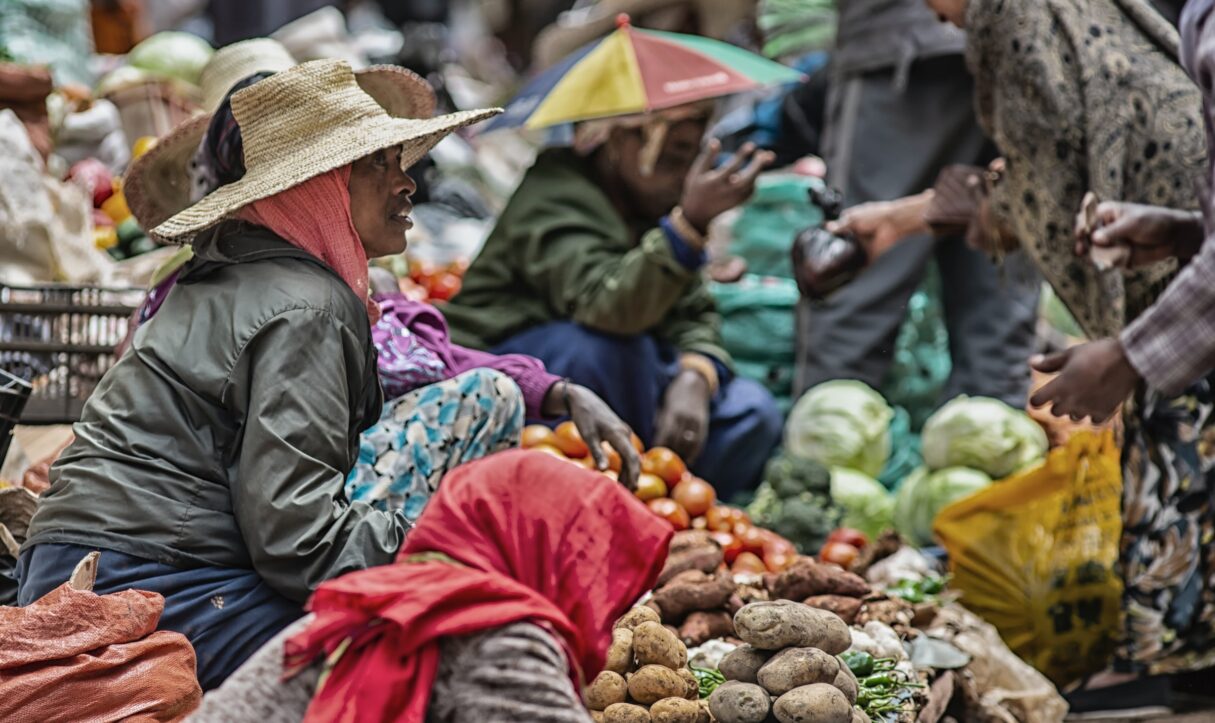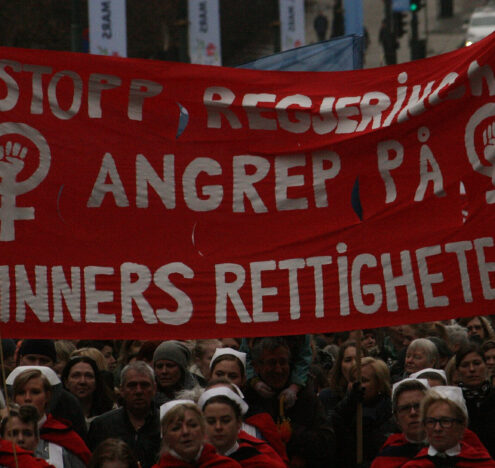In early June 2023, the US government baffled the international community by announcing a deeply consequential suspension of food aid to Ethiopia, the world’s largest recipient of US food aid. This followed a US decision just a month prior to halt food aid to Tigray, Ethiopia’s northern region, where several million people are severely food insecure and are resorting to “extreme coping strategies to survive.” The UN promptly followed the United States, temporarily suspending food assistance to the entire country.
To justify halting food aid to the entirety of Ethiopia, Samantha Power, head of the United States Agency for International Development (USAID), claimed that “food aid intended for the people of Tigray suffering under famine-like conditions was being diverted and sold on the local market.” USAID also leaned into an internal report that cited large-scale aid diversions to military and ex-combatants, in addition to markets, to further support its decision to end food assistance to Tigray in May 2023.
While conditioning the resumption of assistance on reforms against aid diversion, the United States has disregarded the very real harms — including hundreds of starvation-related deaths — caused by the suspension. Instead, it minimized its responsibility by employing bandaid language like: “We are horrified by the ongoing suffering experienced by the people of Ethiopia.” As people in Ethiopia bear the costs of their authorities’ actions and aid agencies’ responses, it is clear that instrumentalizing food aid to pressure reforms against aid diversion is an unnecessarily extreme and cruel strategy.
Increasing Food Insecurity in Ethiopia
The United States has historically been a central actor supporting people’s humanitarian needs in Ethiopia, where food insecurity is among the most severe globally, contributing about $1.8 billion in humanitarian assistance last year alone. In Tigray, the situation is particularly dire as the region continues to recover from the two-year civil war during which starvation was used as a weapon of war.
The horrific implications of the United States’ decisions were clear from the start. Civil society would bear the unbelievable consequences of suspended assistance. Donor emphasis on food theft has not come close to justifying the ethical implications of halting food aid altogether. Tragically, we are now seeing the completely preventable impact on people, especially on Ethiopia’s most vulnerable groups, including children. These harms are particularly evident in Tigray, where the suspension first took place.
“My wish and my prayer are to not see my children dying before me,” Woldesilassie Gebremedhin, a farmer displaced by the recent conflict in Tigray and now living at a makeshift camp in a local school west of Mekelle, told a Reuters team. His wife had already died of hunger. “My boy is hungry now, he is asking me to feed him, but I have nothing left.”
As people in Ethiopia bear the costs of their authorities’ actions and aid agencies’ responses, it is clear that instrumentalizing food aid to pressure reforms against aid diversion is an unnecessarily extreme and cruel strategy.
”Our children are falling like leaves,” said Ashebir Tekay, a government administrator in the Tigrayan town Samre, to “The New Humanitarian” less than two months after USAID’s decision to halt food aid to Tigray. Tekay reported ten children dying that month from malnutrition, an unprecedented toll that he expected to rise. Though people died during the war in Tigray, many more are dying now “as a direct result of no aid,” said the head of the Tigray Region Disaster Risk Management Commission, Gebrehiwot Gebreegziabher.
In recent weeks, reports of other starvation-related deaths, most of which resulted from the suspension of food aid, have surfaced from across Tigray. According to Tghat, a platform founded in 2020 to document Tigrayan civilian casualties, these deaths were reported in hosting sites for internally displaced persons in Abiy Adi and May-Kinetal, in addition to several areas throughout the Northwestern Zone and in the capital of Mekelle. Local news outlets like Tigrai Television reported an immediate increase in starvation-caused deaths in children under five years of age across Tigray after the start of the suspension. One nutrition coordinator at Tigray Regional Health Bureau, Mengsh Bahreslassie, attributed the acute child malnutrition rates in Tigray to the ongoing suspension of humanitarian aid. Child malnutrition rates in Tigray’s Southeastern Zone have doubled since February 2023.
These cases of starvation have exacerbated and contributed to other illnesses, shares one surgeon in Adigrat, Gaym Gebreselassie. His own sons both contracted fungal infections worsened by poor nutrition. One month ago, during a routine operation, a patient of his died because of sepsis aggravated by his starved state. According to Gebreselassie, the suspension of food aid “is a death sentence.”
Duke Burbridge, who covers the humanitarian situation in Tigray, recently predicted that with the expansion of the food aid freeze, “a tragedy similar to the humanitarian meltdown in Tigray could soon engulf the entire nation of more than one hundred million people, many of whom live in areas that are affected by the worst drought in decades.” The prediction is not exaggerated. With the more recent suspension of food aid to the entirety of Ethiopia, individuals, including aid workers, have described an immediate impact. The timing of the suspension is particularly difficult. During an interview, Adam Dagne, founder of the FeedAfrica Initiative based in Addis Ababa, told me, “Especially at this time, during the rainy season in Ethiopia, it’s hard.”
The food suspensions were an extreme reaction to a routine occurrence. In Ethiopia, Dagne told me, “It is very normal to receive food from donors and sell it to the market in different areas in Ethiopia.” According to him, recipients of USAID wheat would often sell that wheat in markets — one of the diversion patterns USAID has recently condemned. The abundance of wheat derived from donors resulted in low prices in the markets. With little wheat from USAID available on the markets now, Dagne argues, locally-produced wheat has become quite expensive. This perceived normalization doesn’t justify the status quo to continue without reforms, since some food was certainly not reaching vulnerable communities that needed it. However, halting all food altogether is startling and truly pushes us to consider who we are hurting.
The Unlearned Lesson
One of the most frustrating elements of this case is that the diversion of food aid happens regularly in aid-receiving countries — and donor agencies have not learned the lesson that freezing aid only punishes the most vulnerable. In 2019, for example, reports of aid diversion emerged in Yemen and were followed by the World Food Program and USAID suspending ongoing assistance programs. At a time when millions of people, including children, needed treatment for acute malnutrition, these aid cuts negatively impacted health facilities. The UN later estimated about 131,000 people died in Yemen from indirect causes, including a lack of food services. Clearly, ordinary people bore the consequences of decisions made without their input and without consideration for their immediate well-being. And aid agencies haven’t learned the tragic lesson: Punishing people for authorities’ behaviors only results in more death.
Rather than doubling down on food assistance efforts and increasing safeguards in recognition of the famine-like conditions in Ethiopia’s northern region and throughout the country, USAID made the extreme and abrupt decision to punish ordinary people until authorities change their behaviors. This logic completely neglects the outsized impact on the people of Ethiopia, who are forced to play a waiting game — one with a high human cost. The United States must consider a more logical, thoughtful, and patient response to aid diversion to ensure the most vulnerable do not suffer from reactionary solutions. Abrupt aid suspension and its tragic consequences will repeat again and again until decision-makers understand that structural changes and reforms should not — and cannot — be made through mass suffering.





















